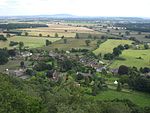Soulton Hall is a Tudor country house near Wem, England. It was a 16th century architectural project of Sir Rowland Hill, publisher of the Geneva Bible. Hill was a statesman, polymath and philanthropist, later styled the "First Protestant Lord Mayor of London" because of his senior role in the Tudor statecraft that was needed to bring stability to England in the fall out of the Reformation. The building of the current Soulton Hall, undertaken during the tumult of the Reformation, is therefore associated with the political and social work required to incubate the subsequent English Renaissance.Soulton Hall is understood to be constructed in an elaborate set of humanist codes drawing together concepts from classical antiquity, geometry, philosophy and scripture. It is further understood that the building influenced the architecture of many later buildings of similar style.With a hidden chapel in its basement, a priesthole, and bookcases hidden within its thick walls to hide heretical documents, Soulton Hall is likely to have served as a base for the conspiracy which led to the publication of the Geneva Bible, which bears the name of Rowland Hill on its frontispiece as publisher.The grounds of the hall contain archaeology of a lost theatre. Emerging scholarship links the manor to Shakespeare, and in particular the play As You Like It which concerns the estate of a character called "Old Sir Rowland". Sir Rowland Hill was a cousin of Shakespeare's mother Mary Arden by reason of the marriage of his heiresses Elizabeth Corbett to Robert Arden in the 1580s.Mentioned in the Norman Domesday Book, Soulton has housed a manor since late Anglo Saxon times, and a "lost castle" rediscovered in 2021 undergoing a multi-season archaeological investigation by DigVentures.
The modern manor incorporates a working farm pioneering various sustainable agriculture approaches, and also houses a series of contemporary monuments including standing stones and long barrow burial site.







